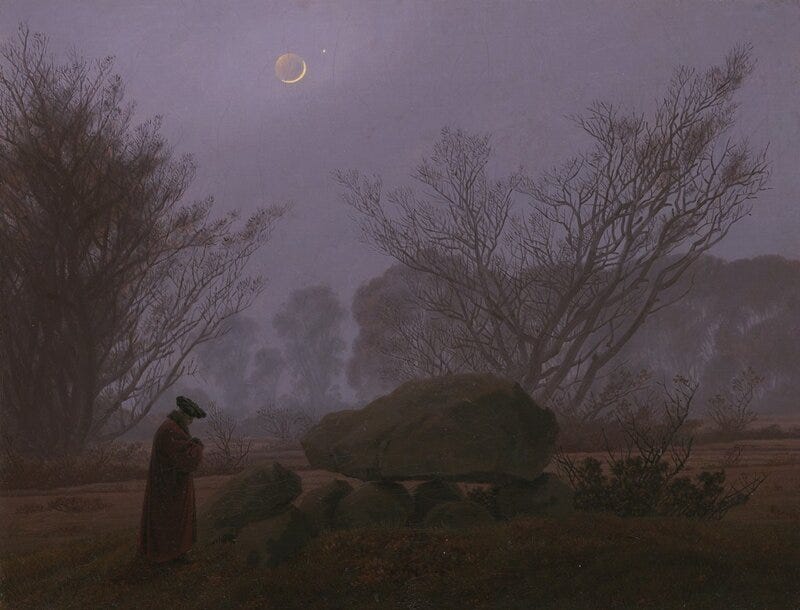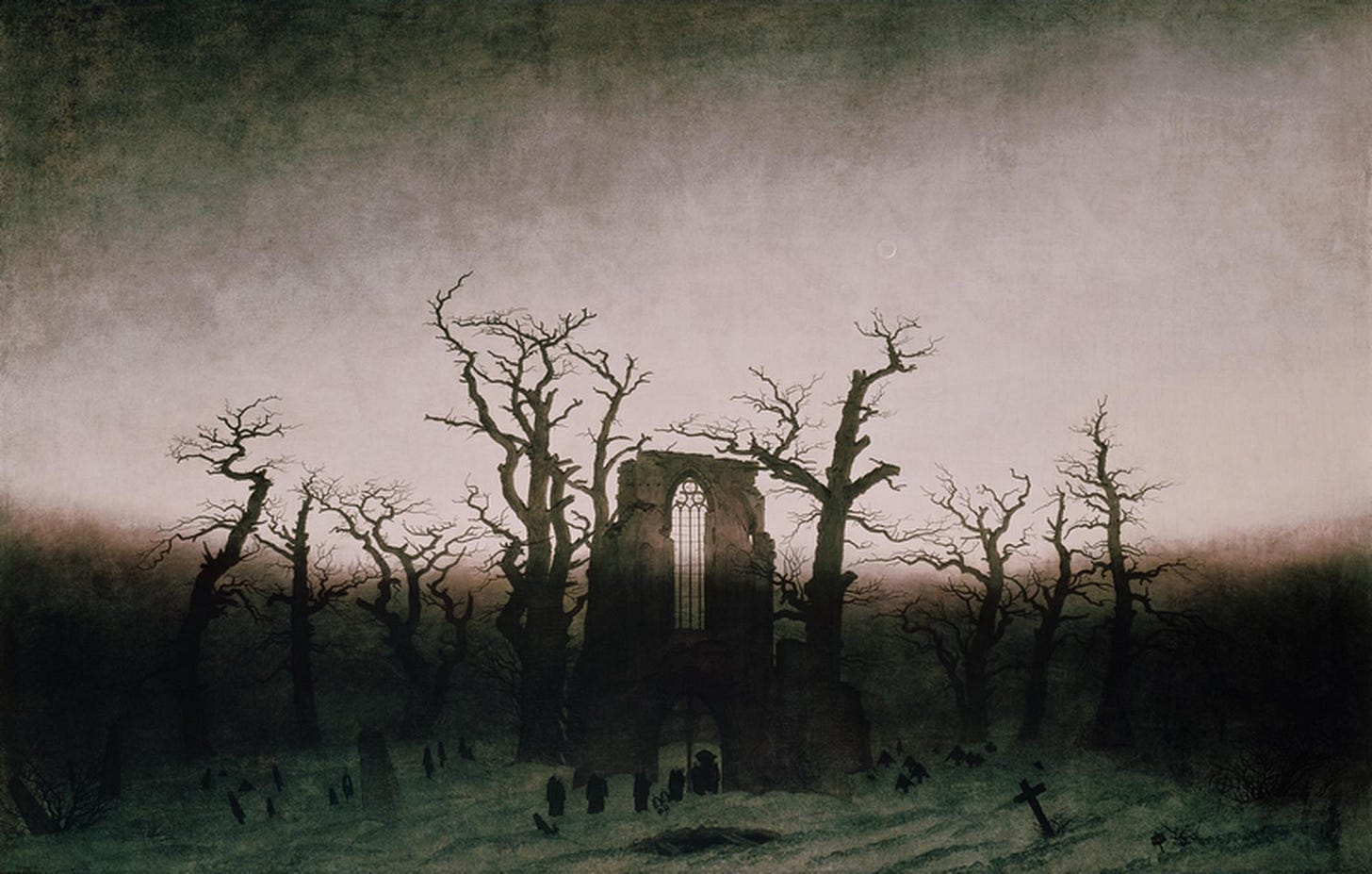The Backgammon Player
An original short story from Euan McCubbin
I was trying not to cry. It wasn’t hard. Steve Brughman was close to me only in the literal sense, a 65 year old electrician whose own electrics gave out. It was a death everyone expected but no one was ready for. A lifelong smoker who despite his wife’s best efforts could never resist a burger. I would say I’ve known men like Steve my whole life if I had done anything more than know of them. We had dinner a couple of times when I first moved in across the street, but after the extent of our differences became clear, we relegated each other to a comfortable 'hello’ as I biked to work each morning.
In the pond of black I stood at the respectful shore. His wife, Sarah, and three children were rightfully front and center. Apart from them the affair seemed banal. I guess that's what happens when you go to a funeral for a man who you only know of. It's distasteful to talk of him this way. It was lucky that Sarah found him soon after he passed. I answered her shriek before the indecency of rigor mortis set in. I found myself using Steve as a template for my own introspection.
‘Are my affairs in order?’
‘What acquaintances would come to my funeral?’
‘Who, if anyone, would write my obituary?’
Apart from his family, I knew few people there. I had made a few pleasantries up to that point, giving my spiel about how much he added to the neighborhood, and how patient of a father figure he was, despite his youngest being 18 when I moved in. The priest had dutifully plodded through the eulogy a half hour before and the pond was beginning to evaporate. A vaguely young lady in a chic black fascinator, and a matching dress came and stood next to me; I prepared to give my two cents on how I knew Steve again.
She said with the slightest of accents, “He was the best Backgammon player there ever will be.”
I had been vaguely aware of Steve playing Backgammon as a tertiary vice of choice. I had seen him playing at block parties and the such, with 5 dollar bills occasionally changing hands, normally out of his pocket into others, a far cry from the claim she made.
I replied, “No? While I didn’t know him that well I think I would know if he was that good at Backgammon. It wasn’t even mentioned in his eulogy?”
“Ah, my error of language,” she said. “Steve Brughman could have been the best Backgammon player that ever could exist.”
Again I was dumbfounded. ‘That could ever exist?’ A claim like that is insanity. Not just to claim to be the best, but the best out of humanity’s infinite futures?
Before I had a chance to parse any further, she continued. “I know you don’t believe me. You see a man who spent his life twiddling copper, with a decidedly average mind when put up to whatever test is in vogue. But, I would not come here if not to mourn excellence beyond compare.”
“‘The best that could ever exist?’ Surely you don’t think humanity is so doomed that another tactical genius will never rival him, even if he was the man you claim him to be.”
“Humanity is doomed, but that matters not. Backgammon is fading, falling further from consciousness every year. However, each stretch of human life engenders itself to different styles of games, leading the best players to arise at vastly different points in history. The analytics required for Chess and Go both are millenia to come. The intuition of Rock Paper Scissors is millenia past. We are in the age of Backgammon, or at least, we were until Mr. Brughman died.”
“You say he could have been the best to ever live, and yet he wasn’t even the best player on our—”
“Because he wasn’t introduced until he was 35, same as you are now. Because he spent his evenings watching sports and gluing wings. Because he had a loving family and a loving wife.
His mind was perfect for an imperfect game. There will be others who can roll a die so masterfully as to rig any game of chance, those who can read minds and divine strategies so masterful that you and I could only grasp them with decades of study. Mr. Brughman had none of those things, but after a lifetime looking at those isosceles he would have demolished anyone who could have possibly faced him.”
“But, but —” At this point I don’t know why I found myself taken by her words. They were absurd, the ramblings of a mad god high. “But why Backgammon? Why not Darts, or Racing or Tic Tac Toe?”
“Tic Tac Toe’s simplicity allows nothing; you know this. Racing has so many variations and rules that there are billions who approach perfection, each in their own specific niche. Even you have a specific time, place and vehicle in which you’d beat the entirety of humanity. Darts has potential, it’s the right degree of defined. Unfortunately, the best STP 501 player that ever could exist will be born 250 millenia after the game is lost to time.
Backgammon is codified. Outside conditions matter of course, but not enough to affect outcomes beyond tolerances. Whether in Antarctica or Arcturus, Mr. Brughman would be victorious.”
By this point the pond had turned to puddles. Sarah was standing with arms around her two sons. The low din of cars ambling home was occasionally pierced by a nearby crow.
After a moment I started again, “But why, Steve, why now? Surely there are a billion other games, arbitrations, stats and observations you can pay homage to? Why isn’t the best Mancala player who could have ever lived being married in Istanbul?”
“Because he was and will be the only one. Aside from competitions inane and specific he was the closest we ever got to true perfection. No other person on this planet or any will be as good at something that they can do in their lifetime. The cruel nature of reality makes the best marksmen born in caves, the best cricketers born without gravity, the best debaters born before syntax and the best painters born with a touchscreen in hand. Steve Brughman is it, he is a tragic and beautiful idea. Please treasure him.”
“I don’t think I can. Even if I believe your claim, I can’t wrap my head around a potential that never flourishes on a man who I liked with such a tempered adequacy!”
At this point I finally looked at her. I can only remember those eyes. As they locked onto mine, their light brown hue shifted darker, until I could barely tell iris from pupil. They ignored parallax, not ignoring my presence but perceiving me as a stitch in the tapestry of the cosmos. They held infinities no human could contain, but that no one but a human could conceive.
I don’t recall how long we stood there. It felt like an instant, but by the time the silence broke, we stood alone.
“But you will try.”
“I will.”
She turned to go, heels digging into soft grass and I stammered, “W-Wait, if you know my age and as much as you imply, what am I good at? What can I do to climb the mountain towards perfection?”
She stopped. Turning imperceptibly, she hesitated for a split second. Then she calmly spoke.
“Nothing. The same as the rest of us. The same as Mr. Brughman.
Goodbye, sir.”
The sun was setting by the time I finally shook my sleeping self aware. The sky had turned crimson and the crow had long since left for grimmer pastures. I plodded back to my car, and autopiloted back to the city.
As I drove home, through the neon signage cluttering my vision, something caught my eye. I pulled into a parking lot, walked into a just closing thrift store, and picked up a wooden box from a display case. The cashier scanned my item and I walked back to the car carrying my brand old backgammon set. As I sat in the front seat I opened it, admiring its faded beauty, each disk, imperfectly perfect. I cried. It wasn’t hard.
Euan McCubbin is studying molecular biology at the University of Washington. He can tell you a lot about Iain M. Banks, quizbowl, and wheat.






